African American Pastoral. Giving Dignity.
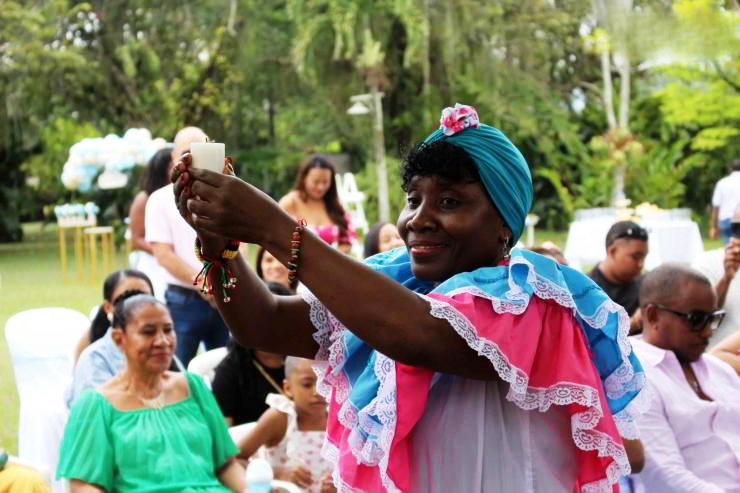
The Comboni missionary, Father Rafaello Savoia is one of the main pioneers of Afro-Latin American pastoral care. Starting from the Gospel, he has made his commitment to the dignity, development and evangelization of black people the commitment of his entire missionary life.
He arrived in Ecuador in 1968 and his first appointment as a 26-year-old missionary was to Limones, in the coastal region of Esmeraldas, in the north of the country. His first impression was that he was in “Africa”. Surrounded by many blacks, he immediately got involved in pastoral work by visiting Christian communities along the river. The daily contact with so many people slowly led him to understand the reality of blacks. He recalls that “I saw clearly that the Afro world is different from that of the indigenous or mixed-race people”. And he continues: “As time passed, something was changing in me in my way of thinking and acting.” One day, Bishop Enrico Bartolucci asked him to take on the secretariat of the Vicariate’s catechesis. “That was the turning point for me and I began to work in the field with the black communities to adapt the catechesis to their particular needs and beliefs.”Father Savoia explains that the work consisted of listening. In the beginning, the work with blacks focused on the black communities of Esmeraldas, which were the most traditional and so best able to preserve the memory of the past. The missionary remembers how interesting the discussions with black communities were on the meaning of life and death, the afterlife, suffering, God or the relationships between men and women.
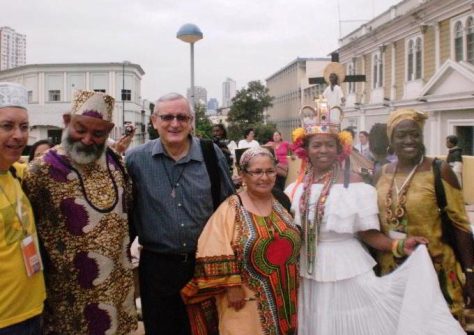
Father Rafaello Savoia (third from left) with some Afro-American leaders during a meeting of the Afro-American Pastoral Ministry. File swm
In August 1968, a meeting on missionary pastoral care was held in Melger (Colombia). And from that meeting, indigenous pastoral care would be created. With a group of priests of African origin, Father Savoia wondered if it was not possible to consider also an African pastoral care method. With the permission of the bishop, Father Savoia travelled to find out if there were experiences of African pastoral care in the Latin American continent. He went to Brazil where he met Father João Lima, a black priest who had written a thesis on the evangelization of blacks in the colonies, and also the Dominican Father Raimundo Cintra, as well as the Jesuit Father Valdelí, who was very familiar with traditional religions of African origin such as Umbanda or Candomblé. He later visited Colombia to learn about the work done by the Instituto Afro Matias Lumumba in Buenaventura, then directed by Father Miguel Ángel Mejía. Upon his return to Ecuador, he proposes to Bishop Bartolucci to bring together several pastoral workers to see how to work in an Afro environment. With the support of Father Mejía and the agreement of the Bishop of Buenaventura, the first Encuentro de Pastoral Afroamericana (EPA) was organized in Buenaventura. It took place from March 19 to 21, 1980. What had happened in Melgar with the indigenous people was happening in Buenaventura with the birth of a method of pastoral care for African Americans.
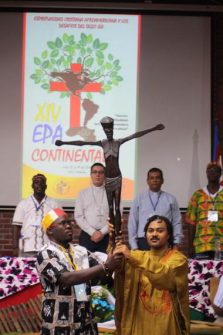
The Afro-American pastoral meeting. More than 134 million people of African descent living in Latin America cannot be forgotten. File swm
Father Savoia recalls the meeting: “There were about 50 participants from Ecuador, Colombia and Panama, of whom only about fifteen were black. Some personalities from the Afro-American world were present, such as the poet Helcías Martán Góngora, and also Father Rafael Arboleda, a Jesuit from the Xaverian University in Bogota, and Father Urrea, who represented the Latin American and Caribbean Episcopal Council (Celam). There was a reflection on Afro-religiousness and pastoral care, and I remember that there was a lot of talk about the work done with Afro-Americans by Bishop Gerardo Válencia Cano of Buenaventura, but the most important thing was that there was the desire and the will to give continuity to this type of meeting. It was decided to schedule them every three years.”
The second Afro-American pastoral meeting took place in Esmeraldas in September 1983. This time the majority of the people at the meeting were Afro-Americans. Father Savoia comments: “There were many discussions because some did not see the point of a specific Afro pastoral care, but in the end, it was the black people present who decided. That is how it began.” Since then, in fact, blacks have been in the majority, without excluding other people.
The sixteenth meeting is scheduled for next year at the national shrine of the Virgin of Luján (Argentina).
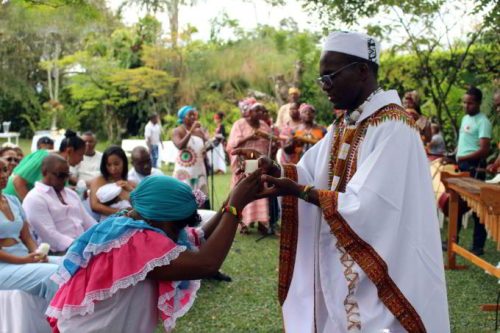
An Afro priest celebrates Mass. Photo: Consolata
Looking back, Father Savoia says: “Significant steps have been taken, but I believe that Afro pastoral care has not yet been received as it should. At the assembly in Mexico in 2021, preparatory to the Synod of Synodality, indigenous peoples were discussed and only at the last moment was it agreed to include “indigenous peoples and Afro-descendants”. This indicates that Afro-descendants are neither a priority nor at the centre, while the Church should always start from the last. Some bishops know nothing about the Afro world, nor do they want to know anything about it and make practically no reference to it. They may also consider it as something secondary, but 134 million people of African descent living in Latin America cannot be forgotten. That is the problem, and that is
why we are still fighting.”
In 2011, the International Year for People of African Descent was celebrated, and from 2015 to 2024, the International Decade for People of African Descent was celebrated. In this context, the United Nations General Assembly created the Permanent Forum for People of African Descent, led by the former Vice President of Costa Rica, Epsy Campbell Barr, an organization that has among its objectives the defence of the rights of people of African descent, perhaps the most neglected group in American societies. “I believe that we must not stop. We must continue to reflect and act so that even in the church, Afro-American peoples have their rightful place.”
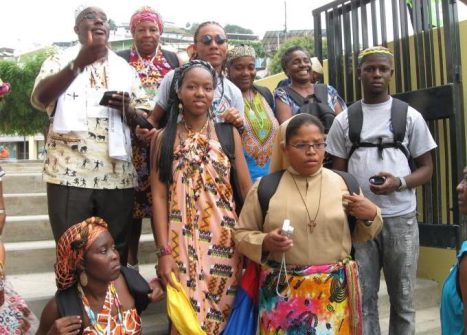
A group of Afro-American pastoral leaders. The question is: “Why are we still fighting? File swm
Today Father Rafaello Savoia lives in Bogota where he directs the Afro-Colombian Centre for Spirituality and Integral Development (CAEDI), with a very extensive documentation on the history, culture and other aspects of the Afro-Colombian world.
He concludes: “In addition to directing the Centre, I continue to do what I have always done, that is, the work of visiting the neighbourhoods of Bogotá where Afro families live. This is the basis of all Afro pastoral work, direct contact with people, listening and building relationships of trust. Indeed, I am already old, I turned 82 in August, and I have some health problems, but I continue to do the same thing I began to do in 1968, accompanying these people. I owe them a lot and, without a doubt, they have marked my missionary life.” (Photo: Eucharistic Celebration in Bogota. Consolata)
Enrique Bayo



